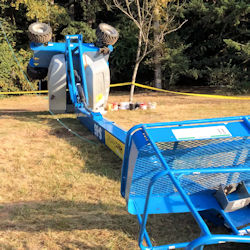Aerial Lift Safe Work Practices
Aerial lift safe work practices are essential to ensure the safety of workers and the efficient operation of the equipment.
To make sure you are not injured while operating an aerial lift, follow these safe work practices:
- Make sure that workers who operate aerial lifts are properly trained in the safe use of the equipment.
- Maintain and operate elevating work platforms according to the manufacturer's instructions.
- Never override hydraulic, mechanical, or electrical safety devices.
- Never move the equipment with workers in an elevated platform unless this is permitted by the manufacturer.
- Do not allow workers to position themselves between overhead hazards, such as joists and beams, and the rails of the basket. Movement of the lift could crush the worker(s).
- Maintain a minimum clearance of at least 10 feet (3 meters) away from the nearest energized overhead lines.
- Always treat power lines, wires and other conductors as energized, even if they are down or appear to be insulated.
- Use a body harness or restraining belt with a lanyard attached to the boom or basket to prevent the worker(s) from being ejected or pulled from the basket.
- Set the brakes and use wheel chocks when on an incline.
- Use outriggers, if provided.
- Do not exceed the load limits of the equipment. Allow for the combined weight of the worker, tools, and materials.
You may also want to visit OSHA's Fact Sheet for Aerial Lifts and 29 CFR 1926.453, Arial lifts.
Knowledge Check Choose the best answer for the question.
1-9. When operating an aerial lift, what is the minimum clearance you must maintain from an energized overhead line?
You forgot to answer the question!

